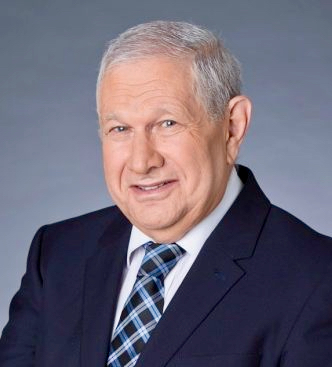
“I carried you on eagles wings” (Exodus 19:4)
Dawn of a New Decade – The Global Pandemic
As the 1st of January 2020 dawned, EL AL was optimistic about the future. It had received 14 new Boeing 787 Dreamliner aircraft, in a major renewal of its long-haul fleet, with two more scheduled for delivery in early 2020. EL AL now had a modern, young, wide-body fleet. It expected to realize soon the significant economic benefits of these advanced and more efficient and comfortable planes. Also, having opened several new routes in 2019, EL AL was preparing to open more new routes in 2020 – to Chicago, Dublin, Dusseldorf and Tokyo.
Yes, there had been a report out of Wuhan, China at the end of 2019 that Chinese health authorities were treating dozens of cases of ‘pneumonia’ of an unknown cause, followed by their identifying it a few days later as a new coronavirus, which became known as ‘Covid-19’. But that was in China – far away.
However, the Covid-19 virus proved to be highly contagious, and numerous deaths from it were occurring in China. During January 2020 the virus started spreading to many countries in Asia and Europe and to the United States. By 30 January 2020 the World Health Organization declared the Covid-19 virus outbreak a ‘global health emergency’, and on 11 March 2020 it recognized Covid-19 as a disastrous ‘global pandemic’.
Spiral to Shutdown of Regular Passenger Flights
As initially there was no vaccine to protect against the Covid-19 virus, countries tried to prevent its spread by imposing restrictions on travel, gatherings and events. This included closing flight routes, restricting travel to certain countries, and limiting entry of citizens of specified foreign countries into their territories. Some imposed mandatory quarantines of passengers arriving from outside the country and even complete prohibitions of entry from abroad.
The closing of numerous international airline routes, and sharp restrictions on passenger traffic, severely impacted virtually all airlines worldwide, and the entire aviation industry experienced its greatest crisis in history. Several airlines went bankrupt. Numerous others, including leading international airlines, had to resort to financial bailouts by their home country governments. Due to the precipitous drop in passenger numbers, thousands of aircraft worldwide were placed in temporary storage and many older models even scrapped. At the same time, thousands of employees were placed on leave or dismissed as airlines tried to reduce heavy losses. IATA, the umbrella airline trade organization, estimated that the civil aviation industry suffered losses of about $118 billion in 2020.
EL AL could not escape the downward spiral caused by the unprecedented crisis. On 30 January 2020 it suspended passenger flights to Beijing, China. In February 2020 it suspended flights to Hong Kong and to Italy, and reduced flights to other European destinations, to Bangkok, Thailand, and to its destinations in the U.S. and Toronto, Canada.
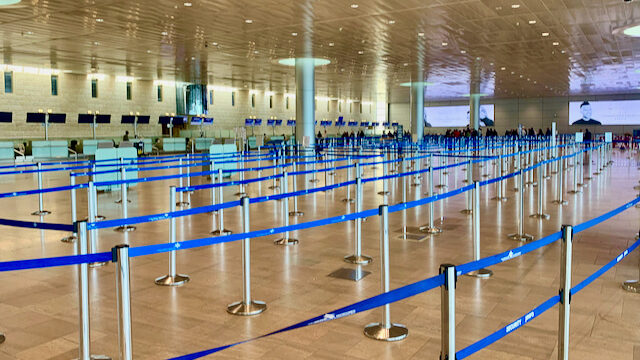
nearly empty due to the pandemic and cancelled flights. (Marvin G Goldman photo)
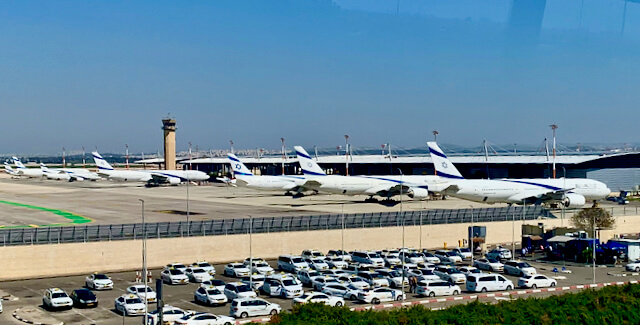
The first case of the virus in Israel itself occurred on 21 February 2020, and Israel started restricting certain travel, limiting gatherings and requiring social distancing. Nevertheless, the virus spread within Israel, as it did in other countries, and on 19 March the Israeli government announced a health emergency in the country. No one knew how long the pandemic would last nor the full extent of its possible severity, but one thing was clear. EL AL’s cash flow from operations was falling rapidly due to the drop-off of passengers, and further action had to be taken quickly. EL AL suspended its intended launch of new routes to Chicago, Dublin, Dusseldorf and Tokyo. It steadily had to drop more and more of its existing routes, and by the third week of March 2020 EL AL was operating only a very limited number of passenger flights, with only five remaining destinations — New York, Toronto, London, Paris and Johannesburg.
Most other airlines flying to and from Israel stopped passenger operations on that route, and those few foreign airlines that continued to fly to Israel operated at a greatly reduced capacity. Tel Aviv’s Ben-Gurion Airport closed its Terminal 1 in early March 2020 due to the lack of flights, only keeping open, on a greatly reduced level, its Terminal 3.
By the last week of March 2020 there was an almost complete absence of demand for regular passenger flights to and from Israel. Finally, with very few customers traveling at all, on 27 March EL AL had to completely suspend its regularly scheduled passenger flights to all destinations.
EL AL ‘Rescue Flights’ Bring Stranded Travelers Home
The surge of worldwide travel restrictions and rapid evaporation of international passenger flights, due to the pandemic, left many Israelis on trips abroad stranded and unable to return to Israel. During March and April 2020 EL AL carried out many ‘rescue flights’ to unusual destinations to bring these Israelis home.
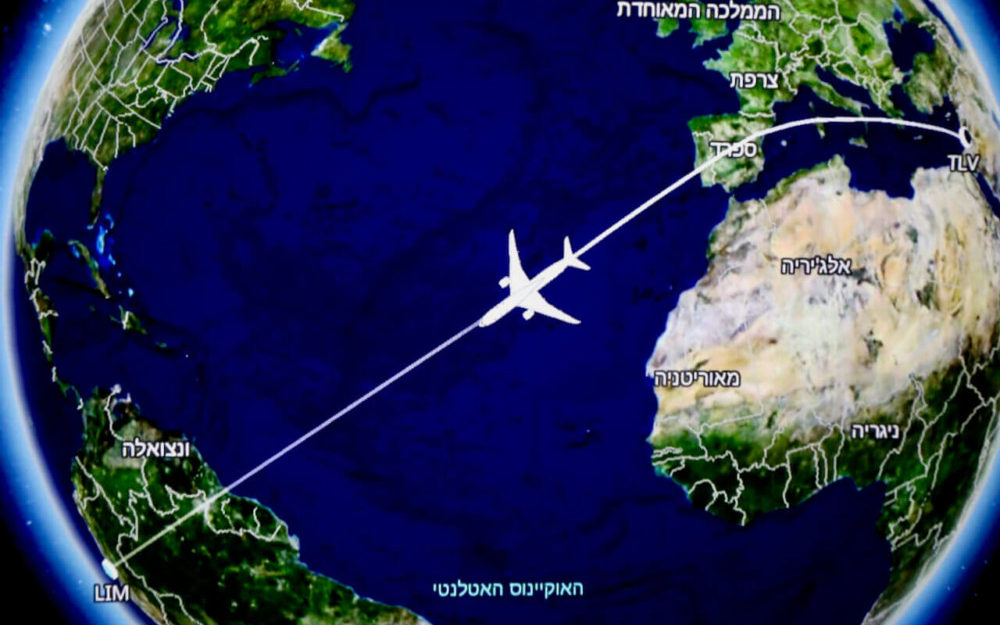
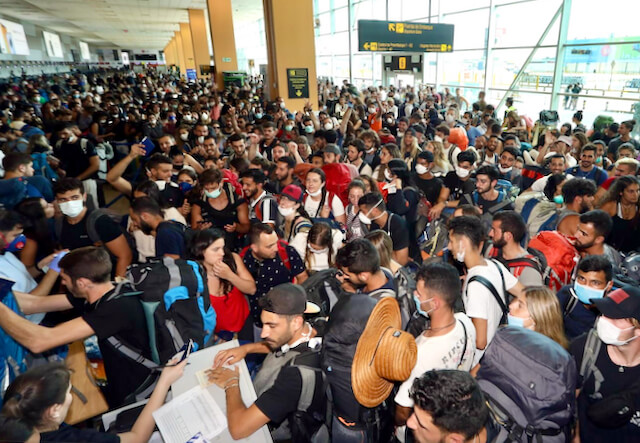
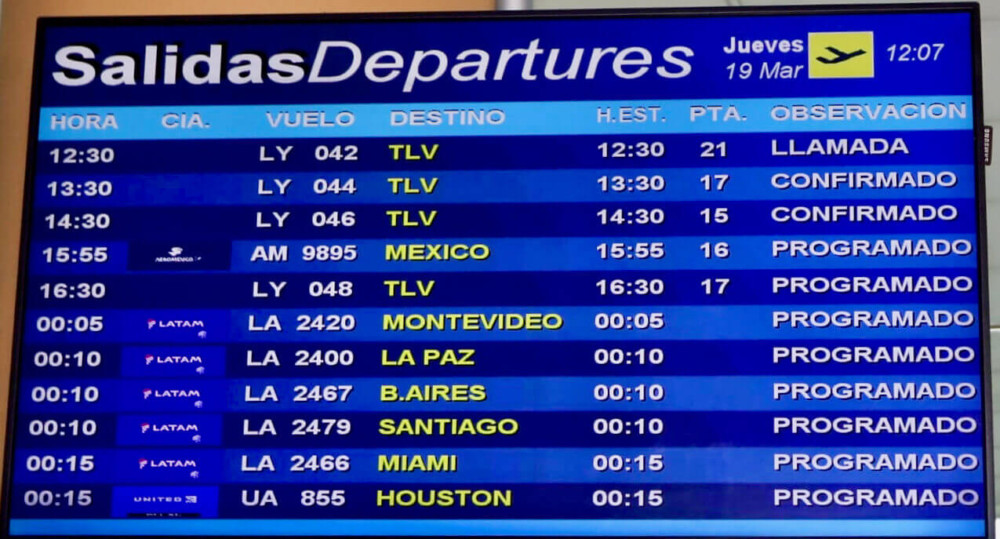
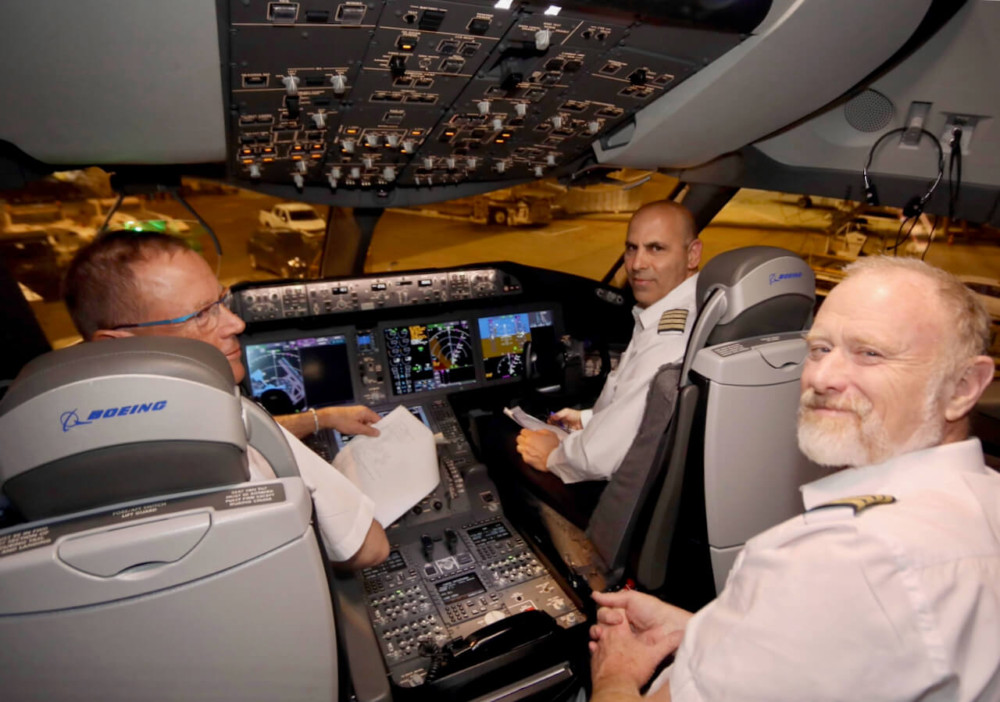
19 March 2020. (Sivan Farag photo)
On 23 March 2020 EL AL operated a rescue flight to Perth, Australia, carrying dozens of Australian tourists home from Israel, and bringing back Israelis returning from Australia, covering 11,077 km. nonstop.
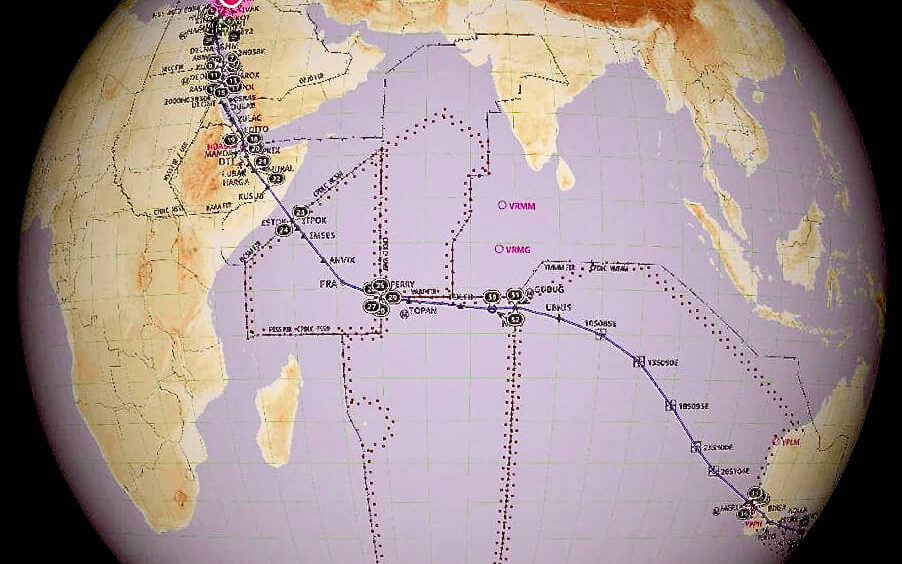
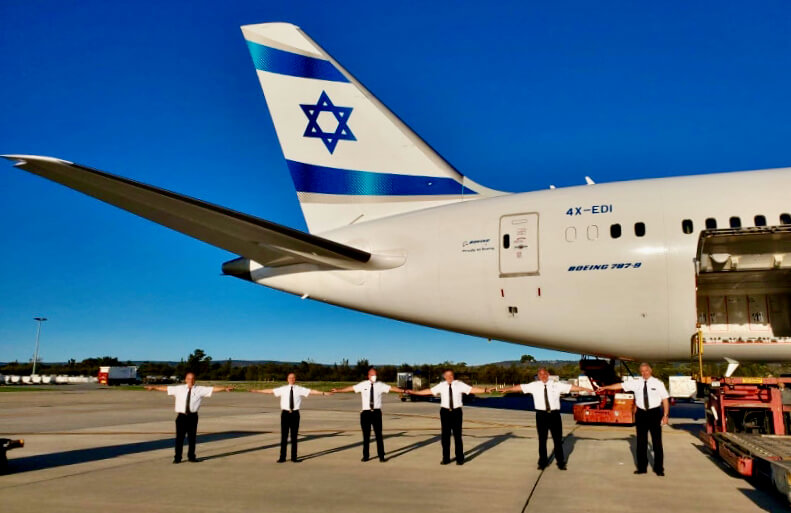
Even more impressively, on 1 April 2020 in a special flight to bring over 250 Israelis home from Melbourne, Australia, EL AL completed the longest nonstop flight ever by an Israeli airline – 13,736 km, 16 hr., 24 min. from Tel Aviv to Melbourne and 17 hr., 20 min. on the next day return, with 787-9 Dreamliner 4X-EDK.
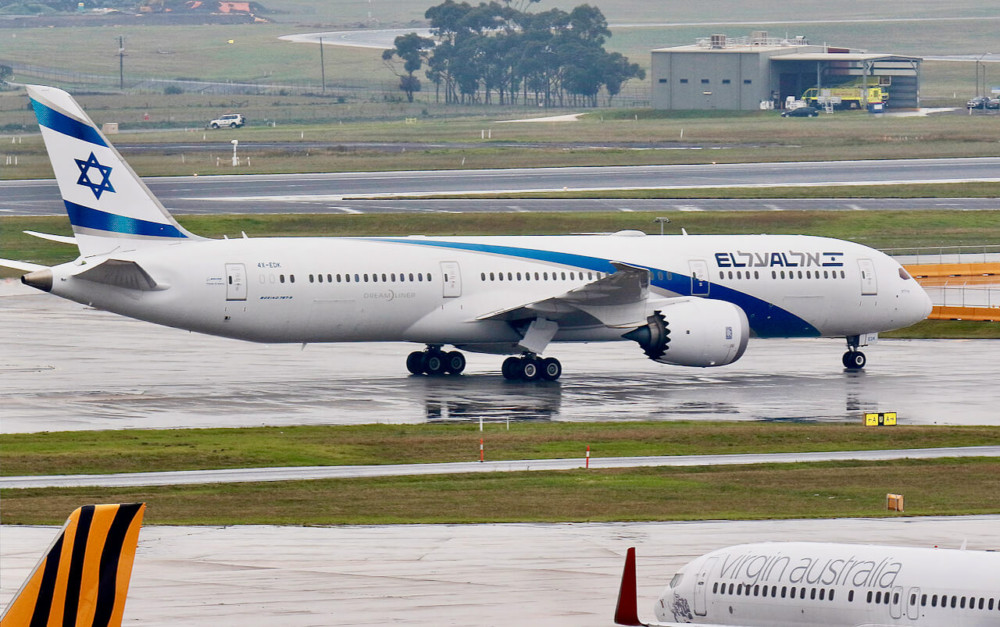
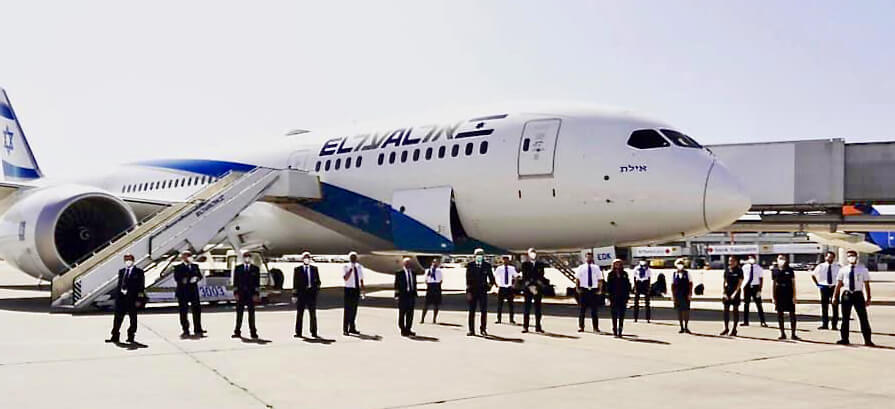
Additional complicated rescue flights were carried out by EL AL in March 2020 to Bogota, Colombia; San Jose, Costa Rica; and Delhi and Mumbai, India.
EL AL Cargo Flies Emergency Medical Equipment to Fight Covid-19
Because aircraft carrying passengers normally transport a significant amount of cargo in their bellies, the suspension of passenger flights to and from Israel caused a great shortage of air cargo transport affecting Israel. EL AL therefore started operating many of its passenger aircraft, including its new 787 Dreamliners, solely for cargo transport — utilizing both the cargo hold and the passenger cabin for more cargo. EL AL also converted some of its 777s for solely cargo use.
The cargo activity included transporting huge amounts of needed emergency equipment and supplies to fight the Covid-19 pandemic. On 5 April 2020, EL AL started an airlift bringing personal protective equipment and other medical supplies from China to combat the Covid-19 virus in Israel, as well as dedicated flights to bring, among other things, essential medications from South Korea and India. Also in April 2020, EL AL commenced cargo flights from China via Israel to various destinations in the United States and Europe, transporting millions of vital medical items, including face masks and shields, ventilators and personal protective equipment. These flights then carried other cargo on their return to Israel.
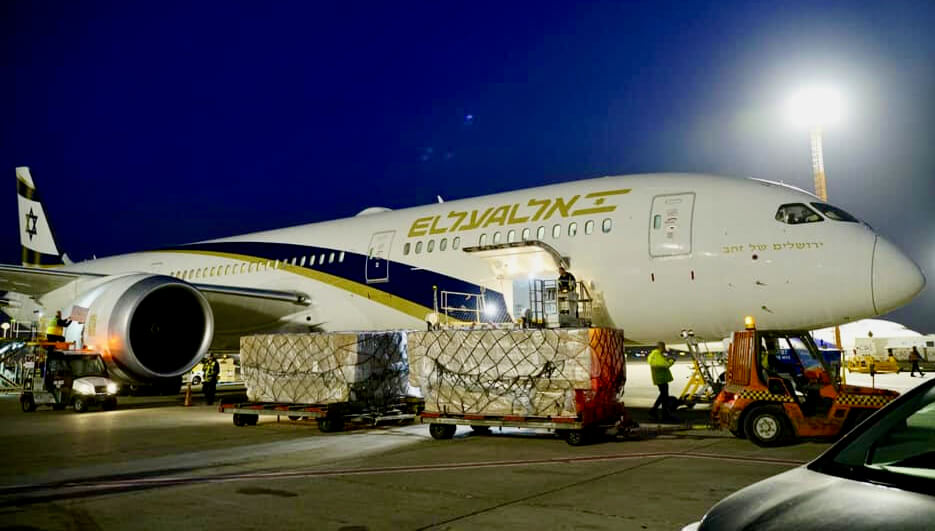
(EL AL/Israel Ministry of Defense)
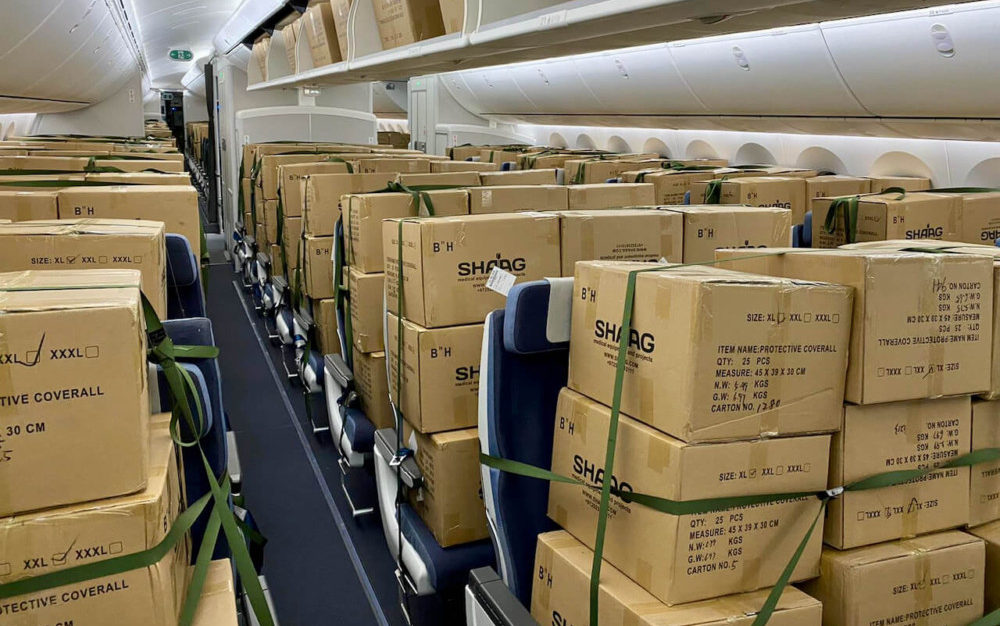
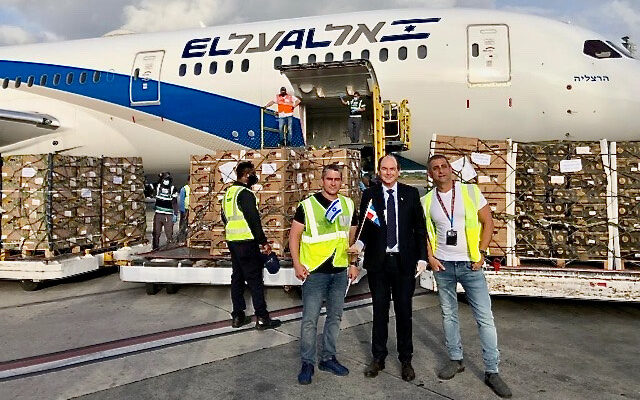
Financial Crisis Hits EL AL Hard
The Covid-19 pandemic and evaporation of scheduled passenger fights hit EL AL particularly hard. The airline already had been confronting fierce competition from other airlines, relatively high operating costs, plus the burden of $3 billion of debt, largely arising from its acquisition of 16 new 787 Dreamliners. With the modern and cost-efficient wide-body 787s, so important to its main routes, EL AL had expected to better compete, win back market share on its routes, expand destinations, and boost revenues and return to sustained profitability. Now that plan was in shambles. As travelers would not, or even could not, fly due to the pandemic, passenger revenue dropped precipitously. EL AL suffered a staggering net loss of $140 million in the 1st quarter of 2020. Moreover, it owed refunds on tickets for cancelled flights amounting to $285 million, while it lacked sufficient cash to pay its debts. The airline’s auditors added a note to its financial statements stating that the viability of EL AL as a going concern was in doubt.
EL AL had no choice but to reduce its cash expenditures as much as possible. Steps for this ‘streamlining’ process included, among others:
Staff: In March 2020 EL AL started placing employees on unpaid leave. By late March 2020 80% of its approximately 6,000 employees were on unpaid leave, and that number soon rose to over 90%. It also reduced work hours for managers, ended recruitment of new hires, terminated new employees in training, and reduced the compensation of executives and board members.
Aircraft and Spares: EL AL converted several of its wide-body aircraft to operate as cargo planes, because demand for international cargo transport continued, driven by the need for medical supplies to combat the Covid-19 pandemic. The airline also arranged to defer lease payments for some of its leased aircraft, returned to lessors three aircraft temporarily leased with crew, and cancelled lease agreements for two additional 737-800 aircraft expected in 2020. It also sold extra aircraft engines and surplus inventories.
Investments. EL AL suspended or canceled projects involving investments, such as the interior renewal of its 777 aircraft fleet and digital and computer-related investments.
In the second quarter of 2020, the Covid-19 pandemic further worsened. In April the Israeli government imposed a series of partial national ‘lockdowns’, temporarily banning travel and other activities. EL AL’s net loss for the first half of 2020 was $244 million, and its working capital at 30 June 2020 was a negative $135 million.
On 1 July 2020 EL AL ordered all of its few aircraft still operating, including those on cargo flights, back to Israel, and totally stopped flying. No one knew how long the shutdown would continue — or whether EL AL would ever fly again. It seemed clear that, for EL AL to have any viable future at all, it had to receive government aid or additional private investment, or both, in substantial amounts.
Negotiations for Israeli Government Assistance
Virtually no airline could manage on its own with the economic consequences of the pandemic, and most airlines worldwide applied for, and received, government assistance. EL AL had to do the same, and in March 2020 it started negotiations with Israel’s Ministry of Finance to obtain a government loan sufficient to enable EL AL’s recovery.
During the negotiations, EL AL’s recovery plan recognized that the airline could continue operations only on a greatly reduced basis. Indeed the Ministry of Finance insisted that, before giving any government aid, EL AL would have to reach new agreements with its four main worker committees enabling it to decrease the number of employees by 1,600 to 2,000 (25-33%), reduce other labor costs and improve efficiency, show annual cost savings of $300-350 million, and cut its aircraft fleet and routes by about 25%. In effect EL AL would become, at least in the near term, a much smaller airline.
To meet one of the government’s conditions for aid, in June and July 2020 EL AL, and the Histadrut (General Federation of Labor in Israel) on behalf of the airline’s four main worker committees, signed separate recovery agreements as to each of the Company’s four employee segments — flight attendants, maintenance & engineering, administration, and pilots, all conditioned on EL AL reaching agreement with the government on a financial aid plan.
The Israeli government recognized the importance of EL AL to the country’s economy and security, and wanted the airline to survive. However, it did not wish to invest in or nationalize EL AL, and it declined to furnish direct grants or loans to the airline. Rather, it asked EL AL to seek bank loans, with the government guaranteeing repayment of a sizable portion of the loans. Also, the Ministry of Finance wanted EL AL’s controlling shareholder Knafaim Holdings (in turn controlled by certain members of the Borovich family), to invest substantial additional funds into EL AL, but no such investment was forthcoming. The Ministry and EL AL then agreed that EL AL would issue additional shares of stock amounting to $150 million in a public offering on the Tel Aviv Stock Exchange, with the State agreeing to purchase all shares not purchased by the public.
A surprising development then arose. On 12 July 2020 Globes–Israel Business News reported that an investor named Eli Rozenberg, aided by a team of attorneys and leading influential figures in the Israeli business community, was looking into buying a controlling interest in EL AL. Under the terms of EL AL’s privatization in 2005, only Israeli citizens can control EL AL. Although Eli Rozenberg was born in New York and at the time was a 27-year old yeshiva student living in Jerusalem, he had become an Israeli citizen and therefore eligible to seek control of the airline.
Moreover, Eli Rozenberg is the son of Kenneth (Kenny) Rozenberg, a businessman based in the U.S. at the time, and the founder, owner and CEO of a company that owns and operates dozens of health care facilities in New York and nearby states. Although Kenny Rozenberg was not an Israeli citizen at the time, his son Eli had the necessary Israeli citizenship, and on 4 August 2020 Eli Rozenberg received a permit from Israel’s Companies Authority qualifying Eli to buy a controlling stake in EL AL. (Seven months later Kenny Rozenberg formally immigrated to Israel, thereby becoming an Israeli citizen, and on 19 May 2021 he, too, received an Israeli government permit allowing himself to become a controlling shareholder of EL AL).
Even though EL AL was not expected to return to profitability in the near future, it was reported that the Rozenbergs wanted to acquire control of EL AL because of patriotism and a belief that the airline has a good long-term future and would be a good business investment.
Two other Israeli businessmen each proposed to purchase EL AL shares in separate private placements. However, Eli Rozenberg offered to purchase at least $100 million of shares in the proposed public offering in return for a number of EL AL’s total shares sufficient to obtain control, and he set up a new wholly-owned Israeli holding company, Kanfei Nesharim Aviation Ltd. (‘Wings of Eagles’ Aviation), to carry out that purchase. The government then insisted that EL AL go forward with the agreed-upon public offering instead of any private placements.
The public offering occurred on 15 September 2020, and Eli Rozenberg through his company Kanfei Nesharim purchased $107 million worth of EL AL shares (figures are rounded), thereby acquiring nearly 43% of EL AL’s total shares, sufficient to control the airline. Neither of the other two significant potential private bidders, nor Knafaim Holdings (the previous controlling shareholder), purchased any shares. Members of the public bought $6 million worth of shares; and the State of Israel, per its agreement, bought the remaining offered shares unsold to the public, namely, $37 million worth, bringing the State’s ownership of EL AL up to about 14%. As a result of this offering, EL AL raised $150 million of additional funds, and the percentage ownership by EL AL’s former controlling shareholder fell considerably.
New EL AL Management Appointed
On 20 October 2020 a new EL AL board of directors was appointed, with the Chairman being David Brodet, a former Chairman of Bank Leumi and former Director-General of Israel’s Ministry of Finance.
A month later the new board appointed Avigal Soreq to be EL AL’s new chief executive officer, effective in January 2021 after a transition period. At the time of his appointment, Soreq was Executive Vice President and Chief Operating Officer of Delek U.S., part of the Israeli energy and infrastructure conglomerate, Delek Group. He had also served as a pilot in the Israel Air Force from 1996 to 2004, rising to the rank of Major.
The Covid-19 Pandemic, and EL AL’s Financial Crisis, Deepen
Almost at the same time as EL AL raised about $150 million in its September 2020 public offering, Israel was hit by a second Covid-19 wave, with soaring numbers of cases and deaths from the virus. In efforts to control the virus, the government imposed on 18 September a second, longer, three-week nationwide lockdown, and set more restrictions on travel through Tel Aviv’s Ben-Gurion Airport. EL AL resumed a limited number of flights to a few destinations in October, but the restrictions on entry and exit imposed by many countries sharply limited the number of passengers willing or able to fly, and a consistent flight schedule could not be maintained.
Passenger numbers plunged, with EL AL’s down 84% in 2020 (and 93% in 2020’s last quarter). Even cargo tonnage declined, due to the worldwide economic slowdown. In all, EL AL incurred a staggering net loss of $531 million in 2020. Cash flow from operations was a negative $139 million, and the airline still owed $234 million to customers who had paid for flights that later had to be canceled. Israeli banks refused to make bank loans to EL AL except at unacceptably high interest rates, even with a substantial government guarantee. The ability of EL AL to continue operations was again seriously in doubt.
The situation at the start of 2021 looked even more dire. Following the emergence and spread of the Covid-19 ‘Delta’ variant in late 2020, the Israeli government imposed on 27 December 2020 a third nationwide lockdown. The lockdown extended to Ben-Gurion Airport which, astonishingly, had to close completely to passenger traffic (except for very limited special cases) from 26 January to 6 March 2021.
EL AL’s 2021 Recovery and Efficiency Plan; and Need for Additional Financial Aid
Fortunately, EL AL’s new management and its new controlling shareholder (Rozenberg’s company Kanfei Nesharim), with the support of the government, were determined to save the airline and carry out a 2021 recovery and efficiency plan. The plan called for additional financing, implementation of agreed-upon efficiencies, and the reduction of expenses and certain debts so as to stop the negative cash flow and return to profitability.
During 2021 and early 2022, Eli Rozenberg through Kanfei Nesharim purchased additional shares of EL AL and also purchased and exercised options to acquire further shares, and Kenny Rozenberg made loans to the airline. In all, the Rozenbergs, through Kanfei Nesharim and directly, injected $238 million in funds for EL AL during 2020 – 2022 to keep the airline going, and as of mid-July 2024 Kanfei Nesharim owns 47.6% of EL AL’s shares. The government for its part granted certain loans to EL AL during 2021-2022, including a $210 million advance in 2021 to pay for flight tickets for aviation security officers on flights of EL AL and Sun d’Or for the next 20 years, enabling EL AL to use those funds to pay debts owed to suppliers and customers.
A particularly painful element of the plan was the requirement to part ways with about one-third of EL AL’s work force in order to meet Israeli government demands for more efficiency as a condition to obtaining needed financial assistance. By the end of 2021 the number of employees declined by about 1,900. Efficiency agreements reached with the different employee sectors also included changes in work processes, eliminating excess inputs, and maximizing the airline’s existing resources.
Regaining Consumer Confidence. The precipitous drop in passenger traffic and revenue starting in early 2020, due to the Covid-19 pandemic, left EL AL with little or no available cash to continue giving refunds to passengers who had paid for flights that later had to be cancelled. In the third quarter of 2020 the airline started offering, as a substitute for cash refunds, vouchers for future flights, with each voucher having a value 25% more than the amount paid for the original cancelled flight. Then when EL AL finally received additional capital investments and government advances in 2020-2021, it prioritized the settlement in full of all its customer refund obligations, which it completed in mid-2021. The airline also continued its new policy of offering greater flexibility on flight ticket changes and cancellations.
EL AL Routes During the Pandemic
As described above, due to the Covid-19 virus and attempts to control its spread, Israel and numerous other countries imposed international travel restrictions, including required quarantines and at times complete prohibitions on travel to or from specified countries (the ‘red’ list). In addition to the virus itself, these restrictions sharply curtailed air travel into and out of Israel and severely impacted the entire Israeli tourism industry. The constant changes prevented EL AL from operating a predictable schedule. Many flights had to be cancelled when their destinations suddenly found themselves on the ‘red’ list, and Covid surges affected the ability of many ticketed passengers to travel on their flight dates. EL AL responded by allowing ticketed passengers to change their date or destination of travel without a change fee, or to cancel their ticket without a cancellation charge (except those in the basic ‘LITE’ class) in exchange for a travel voucher for a future flight. Moreover, the sharp drop of passengers meant that many destinations could not be economically served, and they were dropped from the schedule.
— The ‘Abraham Accords’ and Routes to Arab Countries
Notwithstanding the pandemic, EL AL was able to participate in a bright development during this period. On 13 August 2020, Israel, the United Arab Emirates and the U.S. signed a joint statement initiating the normalization of diplomatic and other relations between Israel and the U.A.E. This was followed by similar normalization agreements on 15 September 2020 between Israel and Bahrain, and on 10 December 2020 between Israel and Morocco. These agreements are collectively referred to as the ‘Abraham Accords’, and they mark the first public normalization of relations between Israel and an Arab country since those with Egypt in 1979 and Jordan in 1994.
— United Arab Emirates (Abu Dhabi and Dubai).
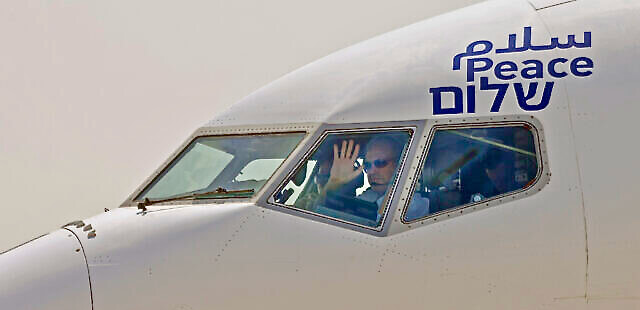
‘Kiryat Gat’, before taking off from Tel Aviv/Ben-Gurion Airport on a special first flight to Abu Dhabi, United Arab Emirates, carrying Israeli and U.S. delegates to meet with U.A.E. counterparts for implementing Israel-U.A.E. diplomatic relations, 31 August 2020. The word ‘Peace’ appears in Arabic, English and Hebrew. (EL AL)
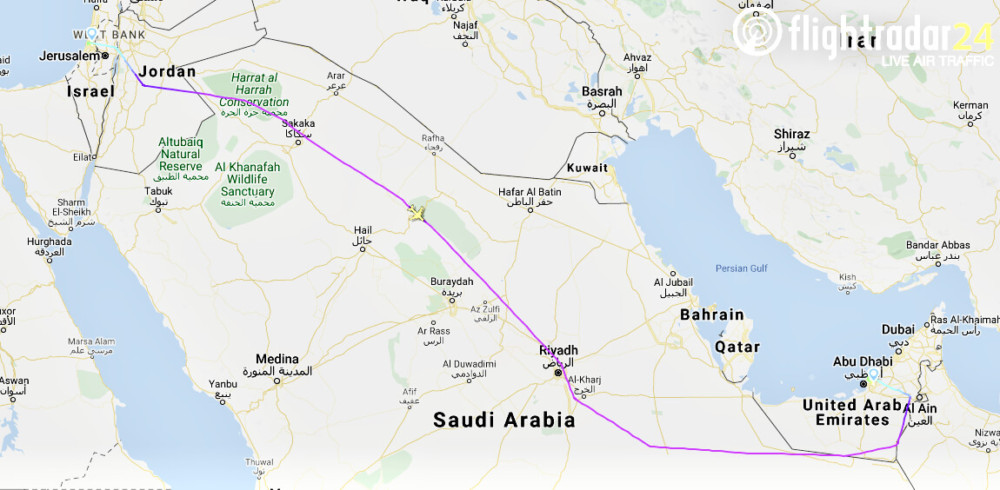
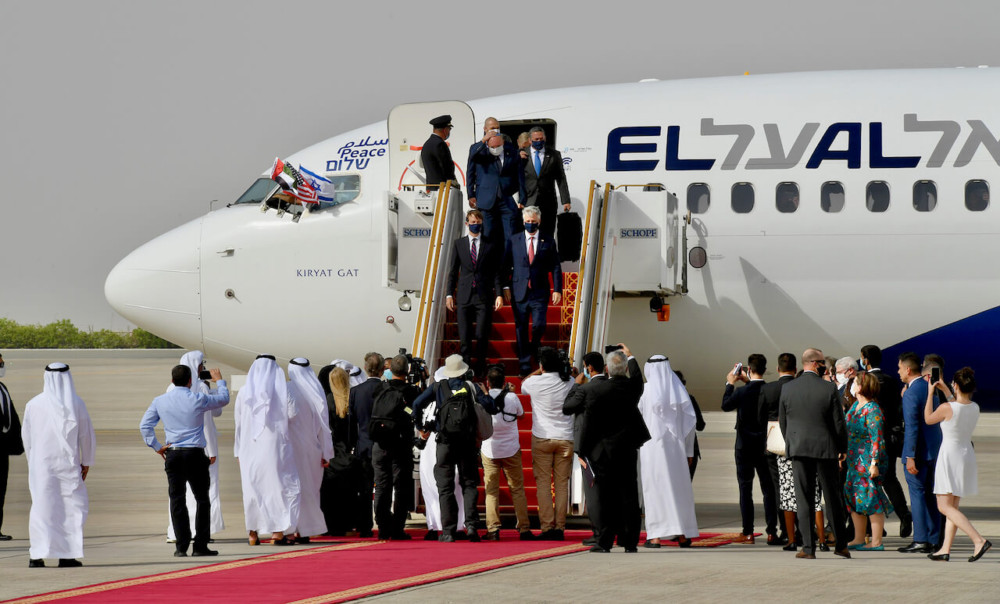

On 16 September 2020 EL AL operated the first Israeli airline cargo flight to Dubai of the U.A.E. This was followed by EL AL’s first passenger flight to Dubai, on 13 December 2020.
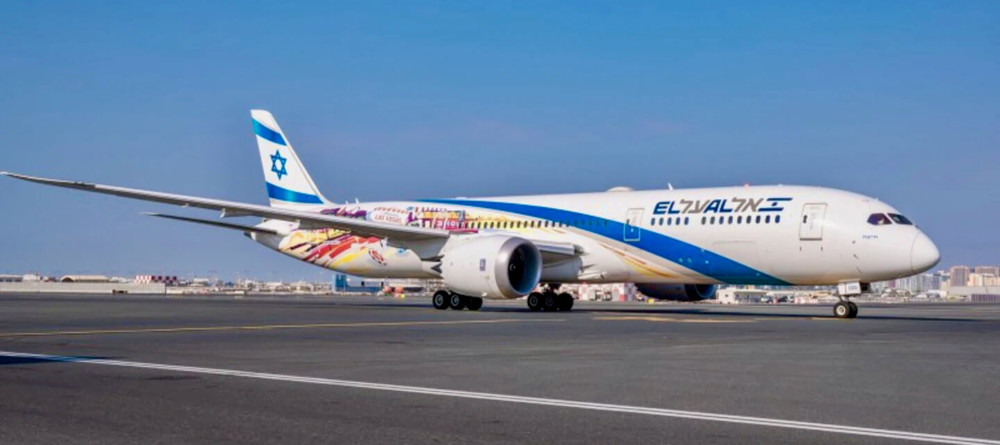
— Morocco. On 22 December 2020 EL AL operated the first flight from Israel to Rabat, capital of Morocco, carrying an Israeli-U.S. delegation, and on 12 January 2021 Israel and Morocco signed an agreement opening the opportunity for future scheduled direct flights between the two countries.
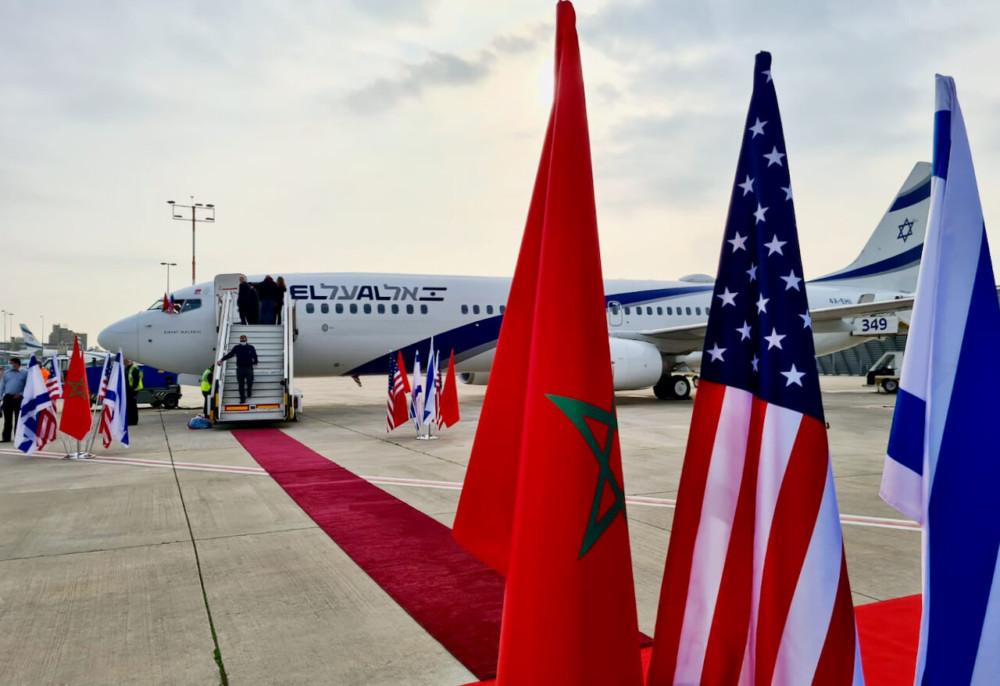
Leadership Changes. In May 2021 David Brodet, Chairman of EL AL’s Board of Directors, stated that he had met the targets he set upon joining the airline to help save it, and he stepped down. On 1 June 2021 Amikam Ben-Zvi, former chairman of the Israel Standards Institution, was elected as the new Chairman of EL AL’s Board of Directors,
At the end of March 2022 EL AL President Avigal Soreq announced that he would be resigning his position to become the CEO of the energy company Delek U.S. Shortly thereafter EL AL appointed Dina Ben-Tal Ganancia to be its next President, and she assumed the position on 1 June 2022. A 14-year veteran at EL AL at the time, she is EL AL’s first woman chief executive officer and one of the few women CEOs in the airline industry.
Summer 2022 Brings New Challenges from Surge in Air Travel
During Spring 2022 Israel’s then-latest Covid surge started to ease, and starting 30 May 2022 the Israeli government (like others) greatly relaxed, and then eliminated, Covid vaccination and testing requirements in respect of air travel. The worldwide easing led to a surge in air travel demand for which airlines including EL AL, and airports including Tel Aviv’s Ben-Gurion Airport, were unprepared. The sharp reductions in airline and airport staff during the peak of the pandemic, and reductions in the number of active aircraft, could not be quickly reversed. Lines at airports lengthened, and airlines, including EL AL, had to cancel or eliminate from their schedule many flights due to shortages of staff, particularly pilots, and lack of sufficient aircraft to meet demand.
In EL AL’s case, the pilot shortage was intensified as many of its pilots were unsatisfied with the cuts to their compensation and revised work rules imposed during the height of the pandemic in connection with EL AL’s financial difficulties. A higher portion than usual of pilots scheduled to operate certain flights were calling in sick, and sufficient replacements were not available. This led to many flight cancellations, some at the last hour, with the resultant loss of revenue and harm to customer service and confidence. Also, EL AL had wanted to reactivate its fleet of six Boeing 777-200 aircraft which had been grounded since 2020, but this required renewed crew training which was delayed. The airline engaged in prolonged negotiations with representatives of its pilots in an effort to resolve their disputes.
Finally, on 10 July 2022 EL AL’s management and the pilots committee signed an agreement whereby the pilots’ salaries are gradually restored to their pre-Covid levels, and the flight disruptions and cancellations ended. The pilots also agreed to undergo retraining for operating EL AL’s grounded 777s that were slated to reenter service.
Hamas Attack and Gaza War. On 7 October 2023 Gaza’s Hamas terrorists fired 5,000 missiles against Israel and launched a surprise ground attack in which it penetrated southern Israel, massacred over 1,200 Israelis, mostly civilians, and kidnapped over 200 Israeli hostages. Israel responded by militarily entering Gaza with the aim of eliminating Hamas’ terrorists and their extensive military infrastructure and rescuing the hostages. As of early February 2025 most of the hostages taken by Hamas were still in captivity or their fate unknown, and a temporary ceasefire was in effect. Among the serious effects of the war, the disruption in air travel to and from Israel has been enormous.
— EL AL as Israel’s Lifeline. The vast majority of other airlines stopped flying to Israel during the war’s duration. Some airlines resumed flights only to halt them again. In contrast, EL AL has continued flying to and from Israel without letup, again acting as the country’s lifeline to the world. As demand for service from different countries significantly changed due to the war, EL AL has had to change its schedules, reducing or eliminating flights to certain destinations, while increasing the number of flights to other places such as those in the United States
Shabbat Flights. EL AL has been known as the’306-day-a-year’ airline because it does not operate scheduled passenger service on Shabbat (the Jewish Sabbath from Friday sundown to Saturday sundown) or on major Jewish holidays. Conversely, EL AL’s main competitors do operate flights to and from Tel Aviv on those days.
As a privately controlled airline, EL AL is not required to consider the same schedule sensitivities as when it was controlled by the Israeli government. Nevertheless, under private control it has retained its policy of not operating passenger flights on Shabbat or major Jewish holidays. Its new controlling owners, Rozenberg and Kanfei Nesharim, have indicated that this policy will continue.
In the past, passenger charter flights marketed by EL AL’s subsidiary Sun d’Or, typically with leased aircraft, sometimes did operate on the Sabbath and Jewish holidays, but under its new controlling owners, Sun d’Or flights no longer operate on those days as well. (Cargo flights, all of which are with leased aircraft or aircraft operated by others, and necessary aircraft maintenance, are still carried out on all days).
Although some observers estimate that this policy costs millions of dollars annually in lost revenue, the absence of Shabbat flights for passenger operations is not considered to be detrimental. Rather, the practice is viewed as a matter of customer service and respect, particularly for the large number of religious Jewish travelers.
Return to Profitability. The many critical steps taken by EL AL management during the pandemic and thereafter, together with the increased demand for air travel following the pandemic, led to a sharp turnaround in its financial condition. In the 4th quarter of 2022 EL AL recorded its first quarterly net profit since 2019, and for the full year 2023 EL AL’s net profit (after taxes) was $116.7 million.
EL AL’s revenues in 2023 exceeded $2.5 billion, the highest annual revenue amount in its history, and its operating cash flow increased substantially. The auditors’ note in its financial statements during the pandemic that cast doubt on its ability to continue as a ‘going concern’ was removed from its current financials.
New Strategic Plan ‘Rising Above and Beyond’. On 28 February 2023 EL AL’s Board of Directors approved a new five-year strategic plan covering 2023-2028. Main elements of the plan include expansion and renewal of its aircraft fleet; expanding the route network; capital raising; alliances and partnerships; improving customer experience and journey; ancillary services; strengthening the EL AL brand; and entering the world of tourism.. During April 2024 EL AL raised an additional $140 million of capital through the issuance of shares and stock options, resulting in a positive capital amount for the first time since 2019, and in May 2024 EL AL’s shares were included in the Tel Aviv-125 stock index.
Frequent Flyer (‘Matmid’) Program. On 1 September 2023 EL AL launched an improved ‘Matmid’ frequent flyer club program. The new program introduces more flexibility and broadens opportunities to earn, retain and redeem points.
Sun d’Or. Sun d’Or is a subsidiary of EL AL and serves as a brand specializing in flights to leisure destinations in the Mediterranean and Europe within a 6-hour flight distance from Israel. Its scheduled flights are promoted through global distribution systems, available on the EL AL website, and can be easily combined with EL AL flights. Also, EL AL ‘Matmid’ club members can earn frequent flyer points on these Sun d’Or flights
Sun d’Or also offers charter flights available for purchase through tourism wholesalers and travel agents and special flights tailored to the unique requirements and needs of companies and organizations.
Tourism. In December 2023 EL AL and the Israeli travel company Issta finalized an agreement to establish a tourism joint venture. EL AL is to own 60% of the new venture, with Issta owning 40%. The venture will develop, market and sell tourism products and services including travel packages that comprise flights, hotels and related financial arrangements. Issta also committed to purchase EL AL shares in a private placement so as to give it a nearly 5% ownership interest in the airline.
Alliances. Presently, EL AL is not a member of any worldwide airline alliance. However, it does participate in ‘codeshare’ commercial agreements with several airlines. A codeshare arrangement allows the sharing airlines to market one another’s flights on certain routes. A seat can be purchased on one airline but the flight can actually be operated in at least one flight segment by the cooperating airline under a different flight number or code. Several of EL AL’s codeshare arrangements with other airlines also allow for reciprocal participation in each other’s frequent flyer programs.
As of February 2025 EL AL has codeshare arrangements, in respect of certain flight itineraries originating or terminating in Tel Aviv, with several member airlines of the SkyTeam Alliance including Delta Air Lines, Air France (as to Paris), KLM (Amsterdam), Aerolineas Argentinas, Aeromexico, SAS Scandinavian Airlines, Vietnam Airlines and Virgin Atlantic, as well as with the following airlines: Air China, Air Portugal, Azerbaijan Airlines (Baku), Bangkok Airways, Ethiopian Airlines, Etihad Airways, Hong Kong Airlines, Iberia (Barcelona and Madrid), jetBlue, LOT Polish Airlines, Qantas, Royal Air Maroc (Marrakech), Siberia (S7) Airlines, TAP Portugal and Thai Airways.
Route Developments. EL AL’s route network has been modified frequently since early 2020, due to the Covid-19 pandemic, changes in competition, fleet size limitations, political relations with certain Arab countries, and the lengthy conflict with Gaza’s Hamas and Islamic Jihad terrorists. Flights to several cities ended, while new destinations were added. The 2020 Abraham Accords led to the start of scheduled flights to Dubai in the United Arab Emirates, Marrakech in Morocco, and Sharm El Sheikh, Egypt, but Marrakech and Sharm El Sheikh were discontinued on account of the Gaza war that started on 7 October 2023. In early 2023, Oman granted EL AL permission to overfly its airspace on its flights to the Far East, substantially cutting flying time and costs, and EL AL flights to Istanbul resumed (under the Sun d’Or brand), but when the Gaza war started Oman withdrew its permission and deteriorating political relations with Turkiye led to the cancellation of the Istanbul route.
As a large majority of airlines stopped their flights to Israel during the Gaza conflict, demand for seats on EL AL aircraft, which continued to fly, exceeded the supply and changed considerably depending on the destination. EL AL had to increase flights and available seats to the U.S. and to certain destinations in Europe and the Far East, while reducing or eliminating other routes. As of February 2025, EL AL operated regular scheduled flights from Tel Aviv to approximately 50 destinations — 40 in western and eastern Europe (some of which are flown under the brand of its subsidiary, Sun d’Or), six in North America (New York, Newark, Boston; Miami and Fort Lauderdale in Florida, and Los Angeles); and four in Asia (Dubai in the United Arab Emirates, Bangkok and Phuket in Thailand, and Tokyo, Japan). The airline also operates special or seasonal flights to other destinations, many under its Sun d’Or brand.
Aircraft. EL AL continues to operate an all-Boeing aircraft fleet, consisting of 44 aircraft in use as of July 2024. Its main long-haul aircraft is the modern wide-body 787 Dreamliner, consisting of 12 787-9 models (271 seats each) and four 787-8s (238 seats). It also has four widebody 777-200s (averaging 290 seats) in service, two of which have been refurbished and upgraded. Its medium and short-range narrow body fleet consists of eight 737-900s (175 seats), 15 737-800 passenger aircraft (averaging 169 seats), and one 737-800 cargo aircraft. (Two 777-200s and one 737-800 are parked and not in use). Of its total of 47 aircraft, 28 are owned and 19 are leased.
EL AL is actively in the process of expanding its long-haul wide-body 787 Dreamliner fleet and renewing its 737 narrow body fleet. Three additional 787-9s have been ordered with one delivery expected in each of years 2024-2026. Also, as of March 2024, EL AL had a preliminary agreement to purchase three other Boeing 787-9s, plus options for six more, with the first three aircraft expected to be delivered in 2029 and 2030, and the optioned 787s to arrive after 2030.
For the renewal of its short and medium-haul fleet, in August 2024 EL AL placed an order with Boeing for 20 737 MAX new aircraft, some to be purchased and some leased, with options to acquire up to 11 more, with the first planes to arrive in 2028. This is EL AL’s largest single order of aircraft in its history.
Summary
EL AL has made a remarkable recovery from the Covid-19 pandemic period of 2020 to early 2022 when its future as a going concern airline was in grave doubt. Although at the start of the pandemic it had a new modern 787 Dreamliner wide-body fleet, it was saddled with very high debt associated with the acquisition of those aircraft. The pandemic then caused air travel and revenues to plunge, resulting in steep losses for EL AL and an inability to meet its obligations.
The airline applied to the Israeli government for financial assistance at the start of the pandemic, but negotiations were difficult, and the government’s Ministry of Finance insisted that EL AL obtain funds from additional private investment and also ‘streamline’ its operations by sharply reducing the number of employees, routes and aircraft.
Fortunately, a new private investor emerged in July 2020 who was willing to inject substantial funds in EL AL in the belief that it is essential for Israel to keep the airline going and also that acquiring control of EL AL would be a good business investment.
At that point the ingredients for recovery and future success started to come together with several parties cooperating. The private investor purchased newly issued EL AL shares of stock and stock options sufficient to acquire control of the airline, and also made certain loans to help stabilize EL AL financially. The airline reached the required efficiency agreements with its employee work committees and pilots. The Israeli government purchased some shares and made advances and loans to help restore the airline’s finances and confidence in its future. An energized new management team was appointed and a comprehensive recovery plan was implemented. Customer service and confidence have been restored, and EL AL received in 2023 a ‘Five Star Global Middle East and Africa’ Award from APEX – The Airline Passenger Expereicne Association.
Profitable operations started to return in the last quarter of 2022, and EL AL has continued to operate profitably since then. Now the airline will be adding more Boeing 787 Dreamliner aircraft to its long-haul wide-body fleet, and has placed a large order with Boeing to modernize its shorter-haul narrow body fleet via the acquisition of new 737 MAX aircraft. EL AL can now look forward to being a better, more competitive, airline, worthy of carrying the flag of the State of Israel as its ‘Flying Star’.
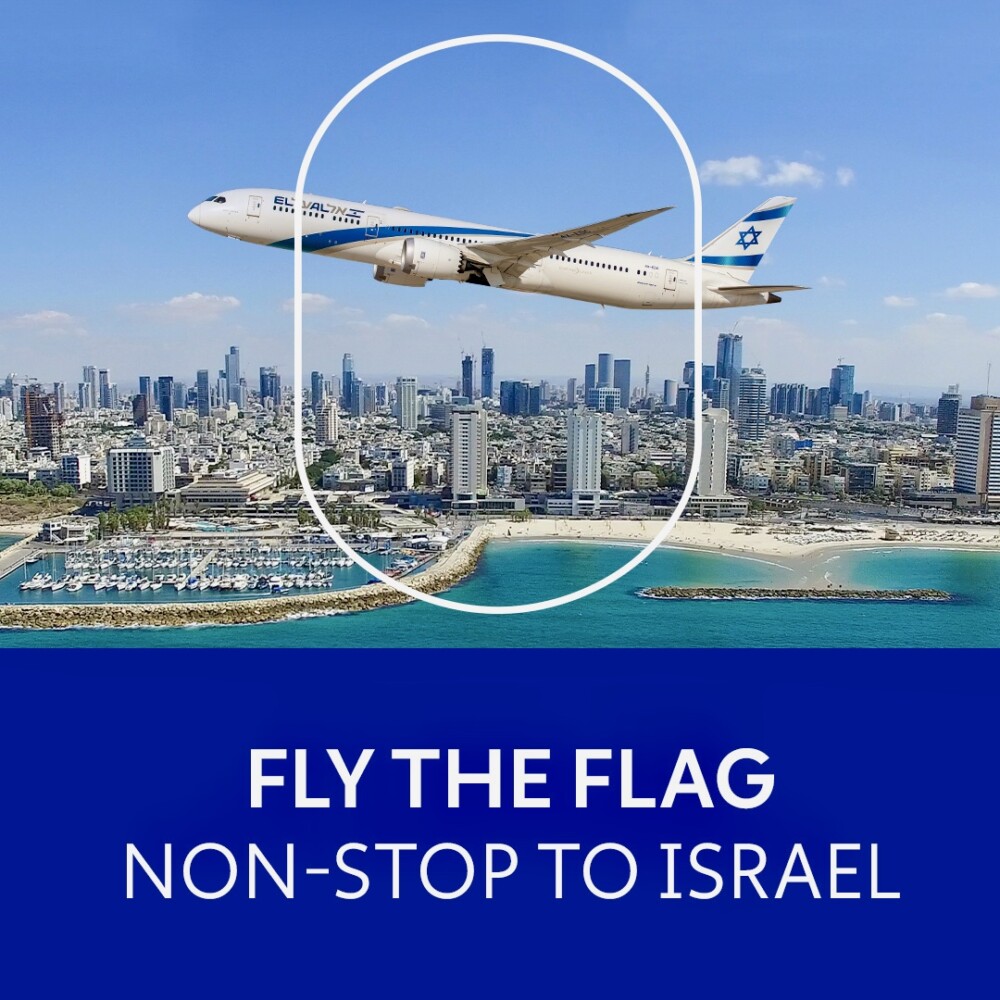
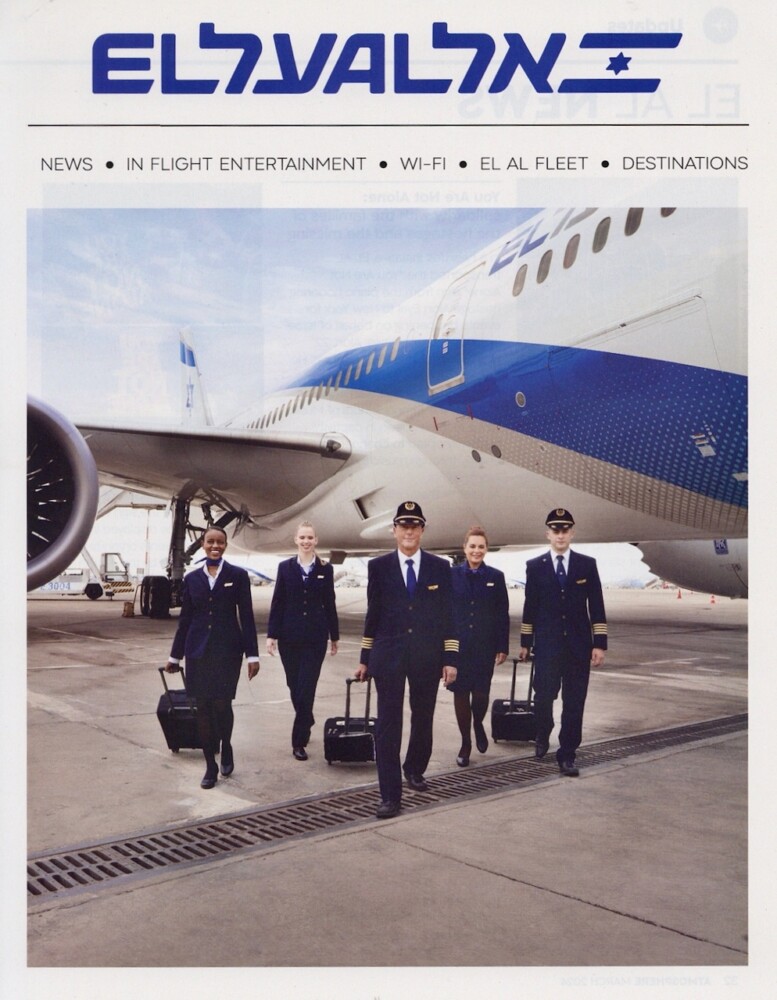
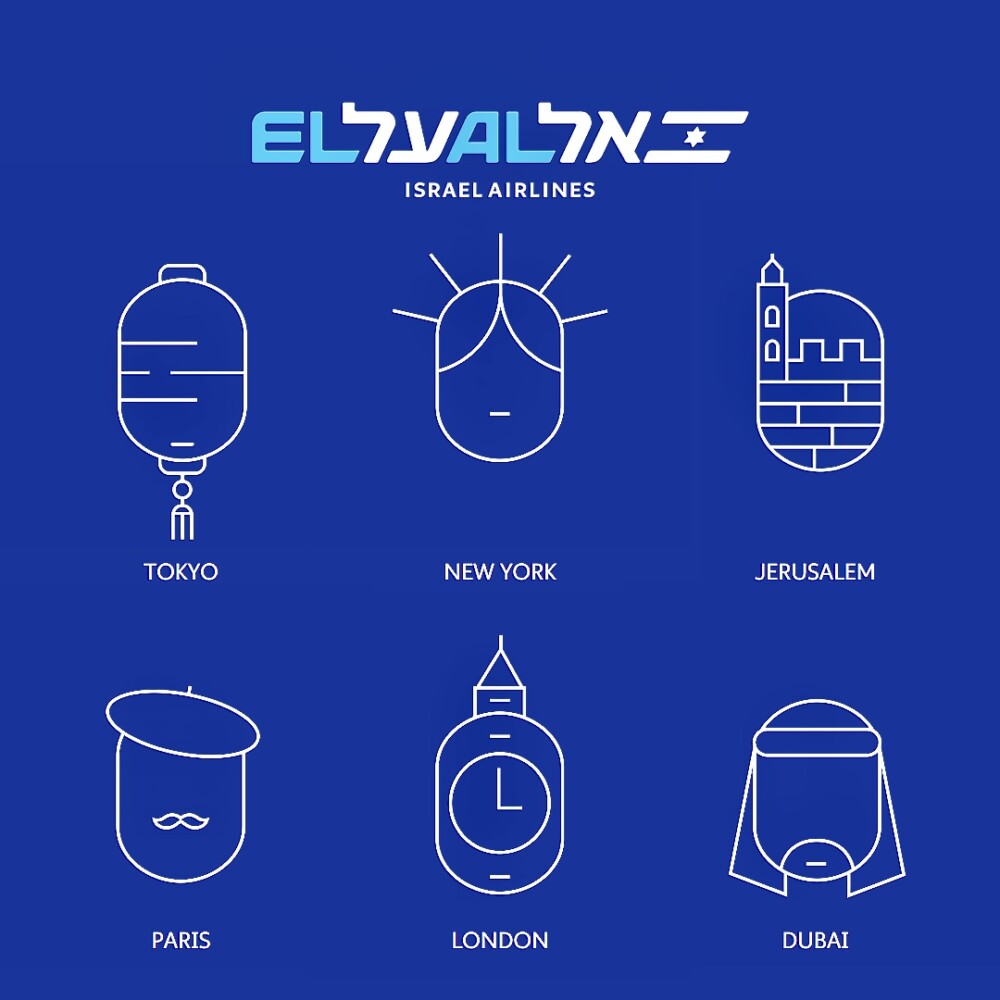
Last updated 10 February 2025.
Copyright 2021-2025, Marvin G. Goldman

